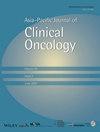Development and validation of Join Clinical Trial Questionnaire (JoinCT)
Abstract
Aim
Participant recruitment has always been a major challenge in clinical trials. This study aimed to develop and validate the Join Clinical Trial Questionnaire (JoinCT), exploring the willingness to join a clinical trial and associated factors in patients.
Methods
This questionnaire development study involved four phases: (i) exploring and understanding the subject matter, (ii) questionnaire development, (iii) content validity testing, and lastly, (iv) field-testing of the questionnaire. For the field-testing phase, a cross-sectional self-administered survey of JoinCT was conducted among cancer patients with various socio-demographic backgrounds and medical conditions. Besides content validity, Cronbach's alpha was used to evaluate the internal consistency of domains, and confirmatory factor analysis was used to evaluate the model fit of the JoinCT framework.
Results
A total of 389 respondents participated in the survey. Based on the results obtained from a field data collection phase, JoinCT consisted of four independent variables domains, namely “knowledge”, “perception of benefits”, “perception of risks”, and “confidence”. The only dependent variable was the willingness to participate in a clinical trial. The minimum Cronbach's alpha was 0.937, and the model fit for the overall framework of JoinCT is also excellent with Comparative Fit Index (> 0.90), root mean square error approximation (< 0.08), and Standardized Root Mean Square Residual (< 0.08).
Conclusions
The Join Clinical Trial Questionnaire (JoinCT) was successfully validated with excellent reliability and validity, and a good model fit. The main factors that contribute to willingness to participate in clinical trials are knowledge, perception of benefits, perception of risks, and confidence.



 求助内容:
求助内容: 应助结果提醒方式:
应助结果提醒方式:


